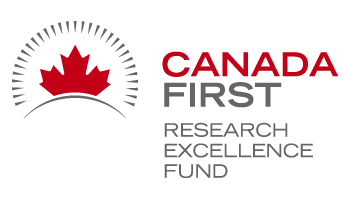
Project Background
METAL EARTH WILL FILL THE KNOWLEDGE GAP TO HELP MEET FUTURE GLOBAL NEEDS
Metals are essential to society (e.g. agriculture, shelter, health, communication, transportation). In the developing low carbon energy economy, metals will be required for energy and infrastructure. Secure supply underpins economic and social sustainability and must meet future demands of rapidly growing world population. Metals are a principal driver of Canada’s economy, constituting 19% of Canada’s total domestic exports and $88.6 billion in GDP in 2016, according to Natural Resources Canada.
FOUNDATION FOR METAL EARTH’S RESEARCH PROGRAM
Metal Earth rests on four points:
- It will build on existing knowledge of ore deposits and their districts, but differs in its approach to resolving the fundamental scientific issues posed by system-scale controls on metal endowment. This requires an integrated, multidisciplinary approach at a much broader scale than previous efforts.
- Entire ore systems will be imaged at full crust-mantle scale to identify key geological, geochemical and geophysical attributes that explain the processes responsible for the extraction of metals from sources, transport pathways, and their economic concentration.
- In contrast to previous lithospheric-scale studies, e.g., Canada’s LITHOPROBE (1990- 2004) Metal Earth will relate deep earth features to the specific distribution of ores.
- Metal Earth also places equal emphasis on less endowed areas, which have been thoroughly explored but largely ignored by research, to refine comparison with well-endowed areas, thereby identifying -fingerprinting- measurable differences that resulted in contrasting metal endowment.
Metal Earth will research, develop, and deploy new 3D & 4D data integration, analysis and visualization tools to aid in the discovery of new deposits through quantitative interpretation at a larger spatial scale than previously done, addressing the significant challenges of deposit-to-craton scale data integration.
Metal Earth will initially focus on Archean volcano-sedimentary greenstone belts, constituting 80% of Earth history, 30% of Canada’s Far North rock exposure and 48% of Canada’s metal wealth to determine what processes are responsible for early Earth’s differential metal endowment. The answer to this fundamental question will require a new understanding of secular changes in the evolution of Earth’s atmosphere, hydrosphere, lithosphere, mantle, and geodynamic environments. These differences should be recognizable at the Earth’s surface.
To achieve this, Metal Earth comprises four integrated activities;
- Broad, craton-scale research to better understand the architecture and interaction of greenstone belts with their surrounding granitoids during terrane assembly and ore district formation;
- Transect research where more detailed studies will aim to resolve the lithospheric-crustal architecture and fluid (magma/heat) pathways, providing a geological framework to resolve the differential endowment of terranes and structures;
- Thematic research at the craton scale will address specific processes or questions on metal endowment;
- Development of data integration, analysis and interpretive tools to predict metal endowment.
MORE ABOUT METAL EARTH
View Projects Published Reports & Papers Ways to Get Involved
CANADA FIRST RESEARCH EXCELLENCE FUND
The Canada First Research Excellence Fund is a tri-agency initiative of the Social Sciences and Humanities Research Council (SSHRC), the Natural Sciences and Engineering Research Council (NSERC), and the Canadian Institutes of Health Research (CIHR). The Fund’s objective is to help Canadian postsecondary institutions excel globally in research areas that create long-term economic advantages for Canada. ~$1.35B has been awarded thus far. For details, www.cfref-apogee.gc.ca/home-accueil-eng.aspx

Mineral Exploration Research Centre at the Harquail School of Earth Sciences
Laurentian University is the only university in Canada where geology and mineral exploration are integral components of its strategic plan. The Mineral Exploration Research Centre (MERC), the research arm of the Harquail School of Earth Sciences, is an internationally recognized and industry-funded hub for exploration science and education. MERC will provide the scientific and administrative nucleus for Metal Earth.
Contact Metal Earth at metalearth@laurentian.ca +1 (705) 675-1151 ext 2339.
935 Ramsey Lake Road, Sudbury, Ontario
P3E 2C6, Canada




